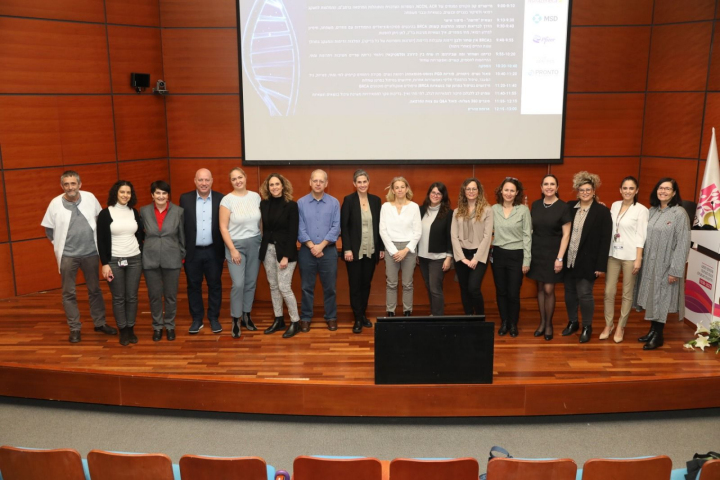A mutated breast cancer gene (BRCA) increases the risk of breast and ovarian cancer. Understanding and managing the gene and resulting cancers was the focus of a successful conference entitled: ‘360 Degrees on BRCA’, hosted at Rambam Health Care Campus (Rambam) in Haifa, Israel, on Wednesday, February 15, 2023.
 Organizers and lecturers of the BRCA Conference at Rambam. Photography: Rambam HCC
Organizers and lecturers of the BRCA Conference at Rambam. Photography: Rambam HCC
All people have BRCA1 and BRCA2 genes. However, mutated BRCA genes may be inherited from either parent. If inherited, their presence increases the risk of developing breast, ovarian and other types of cancers like skin cancer increases.
In 2020, a BRCA test was added to Israel’s basket of national healthcare services. Today, 11 clinics throughout Israel, including the multidisciplinary BRCA Carrier Clinic at Rambam, offer this service. The addition of this test has led to an increase of diagnosed cases in Israel. This has placed a heavy burden on these clinics. For example, around 260 women are currently receiving follow-up care at Rambam’s Center for Early Detection and Prevention of Breast Cancer.
Hence, Dr. Elizabeth Half, director of both the BRCA Carrier Clinic and the Multidisciplinary Center for Early Detection and Cancer Prevention at Rambam, and nurse Rita Wortman conceived of the idea of a national conference focusing on the BRCA genes. They themselves wanted to expand their knowledge so that they could utilize tools for managing every aspect of the BRCA mutations. The 360 Degrees on BRCA conference therefore targeted community healthcare professionals and anyone wanting to know more.
Leading experts presented fascinating lectures on various topics, including genetics, treatment guidelines, psychological and social aspects of cancer treatment, reconstructive surgeries, fertility preservation, embryo selection, and menopause.
Dr. Sharon Bartman Morag, coordinator of the BRCA Carriers Clinic at Rambam, says: “From the moment a patient is diagnosed as a carrier of the gene, we accompany them and provide support in all aspects of their lives.” Morag then further explained the growing need to train healthcare workers to manage the burgeoning number of cases and continue providing quality care.
“Today, in an era of constant inadequacy, it as our duty to enrich the health workers, who are already performing sacred work in many areas. We must give them additional tools to treat, monitor, and manage BRCA mutation carriers and respond to the growing demand more efficiently. Diagnosis, follow-up examinations, treatment, preventive surgeries, and all aspects of patient care must be efficiently managed,” Morag concludes.

